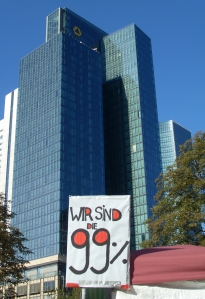31 October
2011
Democracy, The Good and OccupyLSX
From a Guest Blogger: And so we enter another week of the ‘OccupyLSX’ protest outside St. Paul’s Cathedral in London. Once again the protest is in the headlines as not only Dr. Giles Fraser but also the Dean Graeme Knowles have resigned their posts. Meanwhile ‘evil’ capitalists are still beavering away just as ‘feckless’ protestors continue to make an inconvenience of themselves, but hardly so much as to do anyone any real harm.
It is very easy to cast both sides of this debate in rather comic terms. For all the talk of regulation and cuts in bonuses many find it difficult to believe that banks will actually behave more morally. Likewise the initial statement that was for a time on the front page of the OccupyLSX website does little to dispel one’s suspicion that the protestors are just as bourgeois and complacent as the banks they dislike.
Nonetheless, I find myself in broad agreement with the aims and sentiments of the protestors. The present structure of global finance is unsustainable and clearly unjust. I agree that it is better for profits to support the needy rather than further military expenditure. I can only offer them my full support for the ending of government sponsored oppression of all kinds.
Where I disagree is on the role of democracy in achieving wide-ranging if necessary reform. Extension of democratic process seems to be about the only thing the protestors actually support. Incidentally, in their criticism of Global Western Capitalism the OccupyLSX protestors might be interested to note that they have (in varied respects) rather unusual allies in Pope Benedict and Grand Ayatollah Ali Khamenei, with whom they may otherwise have little sympathy.
Oft-touted by the OccupyLSX protestors, Occupy Wall St. and many others around the world is the notion that those protesting represent ‘the 99%’ of people whose money was, and is, being squandered by banks and governments in loans and bailouts with little or no chance of repayment. This may be true (notwithstanding 76.735 statistics being made up on the spot), but weight of numbers is hardly what makes the profligacy of bankers and hedge-fund managers wrong. Advocating such a position is as if to say that the moral energy that drives people to sleeping rough on the steps of St. Paul’s Cathedral is simply the product of an election-losing miscalculation. Were this 99% simply 40% there would seemingly be, in the eyes of such protestors, little per se wrong with run-away profligacy and greed.
Tragically, it is just such an approach to moral behaviour that has contributed in some part to this unfortunate state of affairs. For the banks, choosing to invest in any particular company, hedge fund or government project is based on the chances of getting a good return. If only a small number of people stand to lose through a given financial venture and a large number stand to gain then the venture must be, by such a utilitarian calculation, a good one. But moral value is something far deeper than simply a percentage of popular sentiment, and it is as unchanging as it is undemocratic. The moral value of honesty, just like that of life or of industriousness is not imputed by weight of numbers or common consent. Murder or assault are never morally acceptable even if the person assaulted or murdered belongs to a minority. In order to retain coherence our understanding of morality must be rooted in a good not governed by the majority opinion of the moment. If we are to have a truly sustainable economy it needs to be one founded on principles that do not change as the winds of popular belief swirl and eddy around the stories currently featured in the newspaper or on television.
Camping outside St. Paul’s Cathedral may successfully grab headlines, even headlines which cast the OccupyLSX cause as a spontaneous democratic movement for change, but such change is inadequate. Not only the banks, but even the protestors themselves must find a way to relinquish a morality based on putative quantities of ‘good’ and embrace a moral virtue as fixed and constant as God. After all, morality is not just for 99% of us, but rather for all.
Related Posts:

Leave a Reply to Peter Williams Cancel reply